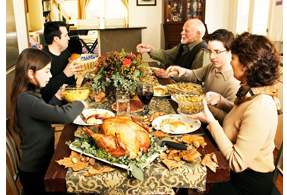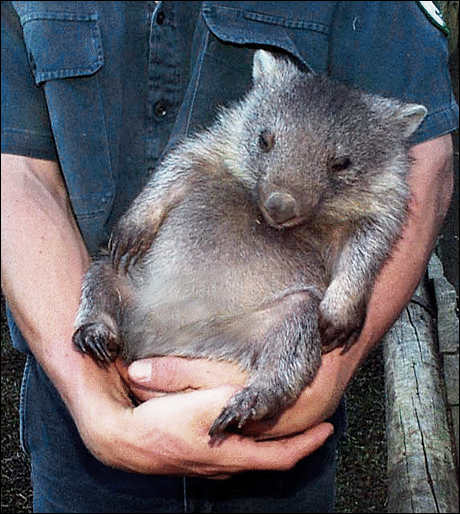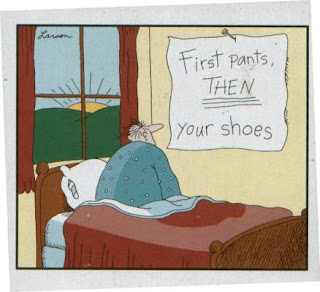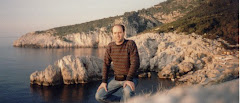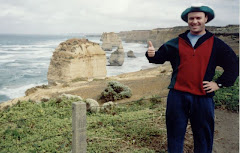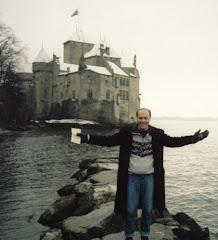TRAVELLER IN THE FAR EAST TRIES ORDERING BREAKFAST
Note: this story is about how two people using the English language build up a fine example of miscommunication. Read it aloud to yourself, pronounce it just the way this text is written.
Room Service: "Morny, ruin sorbees"
Guest: "Sorry, I thought I dialled room service."
RS: "Rye..ruin sorbees..morny! Djewish to odor sunteen?
G: "Uh..yes, i'd like some bacon and eggs"
RS: "Ow July den"
G: "What?"
RS: "Ow July den?..pry, boy, pooch?"
G: "Oh, the eggs! How do I like them? Sorry, scrambled, please"
RS: "Ow July dee baychem...crease?"
G: "Crisp will be fine"
RS: "Hokay. An San tos?"
G: "What?"
RS: "San tos. July san tos?"
G: "I don't think so"
RS: "No? Judo one toes?"
G: "I feel really bad about this, but I don't know what 'judo one toes' means"
RS: "Toes! Toes!...why djew Don Juan toes? Ow bow singlish mopping we bother?"
G: "English muffin!! I've got it! You were saying 'Toast'. Fine, yes, an English muffin will be fine"
RS: "We bother?"
G: "No, just put the bother on the side."
RS: "Wad?"
G: "I mean butter...just put it on the side"
RS: "Copy?"
G: "Sorry?"
RS: "Copy...tea...mill?"
G: "Yes, coffee please, and thats's all."
RS: "One minnie. Ass ruin torino fee, strangle ache, crease baychem, tossy singlish mopping we bother honey sigh, and copy...rye?"
G: "Whatever you say"
RS: "Tendjewberrymud"
G: "You're welcome."
And now with subtitles, just to be sure...
Room Service (RS): "Morny. Ruin sorbees"
Room service Translation (RST): "Morning, room service"
Guest (G): "Sorry, I thought I dialed room-service"
RS: "Rye..Ruin sorbees..morny! Djewish to odor sunteen??"
RST: "Right! Room service! Do you wish to order something?"
G: "Uh..yes..I'd like some bacon and eggs"
RS: "Ow July den?"
RST: "How would you like them?"
G: "What??"
RS: "Ow July den?...pry, boy, pooch?"
RST: "How would you like them? Fried? Boiled? Poached?"
G: "Oh, the eggs! How do I like them? Sorry. Scrambled please."
RS: "Ow July dee bayhcem...crease?"
RST: "How would you like the bacon? Crisp?" [=kross]
G: "Crisp will be fine."
RS: "Hokay. An San tos?"
RST: "OK. And some toast?"
G: "What?"
RS:"San tos. July San tos?"
RST: "Some toast. Would you like some toast?"
G: "I don't think so"
RS: "No? Judo one toes??"
RST: "No? You don't want toast?"
G:"I feel really bad about this, but I don't know what 'judo one toes' means."
RS: "Toes! Toes!...why djew Don Juan toes? Ow bow inglish mopping we bother?
RST: "Toast! Toast! Why do you don?t want toast [!!] ? How about an English Muffin with butter?"
G: "English muffin! I've got it! You were saying 'Toast.' Okay, fine...Yes, an English muffin will be fine."
RS: "We bother?"
RST: "With Butter?"
G: "No, just put the bother on the side."
RS: "Wad?"
RST: "What?"
G: "I mean butter...just put it on the side."
RS: "Copy?"
RST: "Coffee?"
G: "Sorry?"
RS: "Copy...tea...mill?"
RST: "Coffee? Tea? Milk?"
G: "Oh,yes.. Coffee please, and that's all."
RS: "One Minnie. Ass ruin torino fee, strangle ache, crease baychem, tossy singlish mopping we bother honey sigh, and copy ... rye?"
RST: "One minute. That's room twenty-three, scrambled eggs, crisp bacon, toast and english muffin with butter on the side, and coffee. Right?"
G: "Whatever you say"
RS: "Tendjewberrymud"
RST: "Thank you very much"
G : "You're welcome"
domingo, 18 de dezembro de 2011
terça-feira, 13 de dezembro de 2011
Drunk Driving
Driving under the influence (DUI) (driving while intoxicated (DWI), drunken driving, drunk driving, operating under the influence, drinking and driving, impaired driving) is the act of driving a motor vehicle with blood levels of alcohol in excess of a legal limit. Similar regulations cover driving or operating certain types of machinery while affected by drinking alcohol or taking other drugs. This is a criminal offense in most countries. Details of the offense depend upon the jurisdiction, and may include merely being in physical control of a motor vehicle while being under the influence of alcohol or drugs.
sexta-feira, 2 de dezembro de 2011
Songs of the Week - Queen / Louis Armstrong
Love of My Life
by Queen
What a Wonderful World
by Louis Armstrong
Recipe of the Week - Mini Panettone
Mini Panettone
Makes 10
Preparation and cooking times
plus 1½-2hrs rising
Ingredients
- 2 eggs plus 1 yolk
- 1 tsp vanilla paste or extract
- 500g plain flour
- 2 x 7g sachets easy-bake dried yeast
- 100g caster sugar
- 200ml warm milk
- 200g soft butter
- 140g mixed dried fruits
- 100g mixed candied peel
- milk , for brushing
- 1-2 tbsp flaked almonds
- Beat the eggs and yolk with the vanilla. In a large bowl, mix the flour, yeast, sugar and ½ tsp salt. Add the warm milk and egg mixture, then beat to a very soft, sticky dough with a wooden spoon. Cover with cling film and leave in a warm place until the dough has doubled in size.
- Drop large muffin wraps into 10 clean, 200g size cans (or use a muffin tray), or line them carefully with baking parchment so that the paper comes well above the cans to make a collar.
- Blend the butter, fruit and peel into the risen dough, preferably with your hands. Cut into 10 equal pieces and drop a piece into each prepared can. Cover again and leave until they are very well risen.
- Heat oven to 190C/170C fan/gas 5. Gently brush the panettone with milk, scatter over the almonds and bake for 25-30 mins until golden. Eat within 3 days, or freeze for up to 6 weeks.
PER SERVING
472 kcalories, protein 9g, carbohydrate 71g, fat 20 g, saturated fat 11g, fibre 2g, sugar 30g, salt 0,65 g
quarta-feira, 30 de novembro de 2011
Funny Videos - Interviews in English
Interviews in English
Entrevista com Anderson - Manchester United - Legendado
TÉVEZ - VERY DIFFICULT - BIEN SUBTITULADO ESPAÑOL INGLÉS
Joel Santana com Legenda
Miss Brasil 2009 falando inglês
E aí, tem certeza que falar inglês não é importante?
Book of the Week - Moby Dick
Moby Dick
by Heman Melville
Moby-Dick; or, The Whale,[1] was written by American author Herman Melville and first published in 1851. It is considered by some to be a Great American Novel and a treasure of world literature. The story tells the adventures of wandering sailor Ishmael, and his voyage on the whaleship Pequod, commanded by Captain Ahab. Ishmael soon learns that Ahab has one purpose on this voyage: to seek out a specific whale--Moby Dick, a ferocious, enigmatic white sperm whale. In a previous encounter, the whale destroyed Ahab's boat and bit off his leg, which now drives Ahab to take revenge.
In Moby-Dick, Melville employs stylized language, symbolism, and metaphor to explore numerous complex themes. Through the main character's journey, the concepts of class and social status, good and evil, and the existence of God are all examined, as Ishmael speculates upon his personal beliefs and his place in the universe. The narrator's reflections, along with his descriptions of a sailor's life aboard a whaling ship, are woven into the narrative along with Shakespearean literary devices, such as stage directions, extended soliloquies, and asides. The book portrays destructive obsession and monomania, as well as the assumption of anthropomorphism--projecting human instincts, characteristics and motivations onto animals. Moby-Dick is ruthless in attacking the sailors who attempt to hunt and kill him, but it is Ahab who invests Moby-Dick's natural instincts with malignant and evil intentions. In fact, it is not the whale but the crippled Ahab who alone possesses this characteristic.
Moby-Dick has been classified as American Romanticism. It was first published by Richard Bentley in London on October 18, 1851, in an expurgated three-volume edition titled The Whale, and weeks later as a single volume, by New York City publisher Harper and Brothers as Moby-Dick; or, The Whale on November 14, 1851. The book initially received mixed reviews, but Moby-Dick is now considered part of the Western canon,[2] and at the center of the canon of American novels.
To download this book in PDF, go to:
http://www.planetebook.com/ebooks/Moby-Dick-2.pdfTo listen to an Audiobook, go to:
http://librivox.org/moby-dick-by-herman-melville/To watch the movie with subtitles in Portuguese:
For the other chapters, go to:
http://www.youtube.com/watch?v=HIfKubCgZ-4&feature=related
segunda-feira, 21 de novembro de 2011
My trips 6 - Peru
I went to Peru in September 2007 mainly in order to visit Machu Picchu, which by the way means Old Mountain in Quechua, the language spoken by the Incas. This place is amazing in many aspects, specially by how the rocks were piled up making the walls. The Incas could not write, so there is no written record of their achievements. Machu Picchu was a sacred place, there were no bathrooms there in the past, neither now.
You can't fit a single piece of paper between these stones
The twelve-angle stone - Cuzco
Shuttle bus that links Aguas Calientes to Machu Picchu
Inca Bridge
Jokes 17
The doctor to the patient: 'You are very sick'
The patient to the doctor: 'Can I get a second opinion?'
The doctor again: 'Yes, you are very ugly too...'
Son: Dad, what is an idiot?
Dad: An idiot is a person who tries to explain his ideas in such a strange and long way that another person who is listening to him can't understand him. Do you understand me?
Son: No.
Man: I could go to the end of the world for you.
Woman: Yes, but would you stay there?
Man: I offer you myself.
Woman: I am sorry I never accept cheap gifts.
Man: I want to share everything with you.
Woman: Let's start from your bank account.
The patient to the doctor: 'Can I get a second opinion?'
The doctor again: 'Yes, you are very ugly too...'
Son: Dad, what is an idiot?
Dad: An idiot is a person who tries to explain his ideas in such a strange and long way that another person who is listening to him can't understand him. Do you understand me?
Son: No.
Man: I could go to the end of the world for you.
Woman: Yes, but would you stay there?
Man: I offer you myself.
Woman: I am sorry I never accept cheap gifts.
Man: I want to share everything with you.
Woman: Let's start from your bank account.
terça-feira, 15 de novembro de 2011
Topics on Culture - Holidays - Thanksgiving
Thanksgiving Day is on Thursday, November 24, 2011.
History
In 1621, the Plymouth colonists and Wampanoag Indians shared an autumn harvest feast that is acknowledged today as one of the first Thanksgiving celebrations in the colonies. For more than two centuries, days of thanksgiving were celebrated by individual colonies and states. It wasn't until 1863, in the midst of the Civil War, that President Abraham Lincoln proclaimed a national Thanksgiving Day to be held each November. Thanksgiving is celebrated on the fourth Thursday of November in the United States. In Canada it is celebrated on the second Monday in October.
Thanksgiving at Plymouth
In September 1620, a small ship called the Mayflower left Plymouth, England, carrying 102 passengers—an assortment of religious separatists seeking a new home where they could freely practice their faith and other individuals lured by the promise of prosperity and land ownership in the New World. After a treacherous and uncomfortable crossing that lasted 66 days, they dropped anchor near the tip of Cape Cod, far north of their intended destination at the mouth of the Hudson River. One month later, the Mayflower crossed Massachusetts Bay, where the Pilgrims, as they are now commonly known, began the work of establishing a village at Plymouth.
Throughout that first brutal winter, most of the colonists remained on board the ship, where they suffered from exposure, scurvy and outbreaks of contagious disease. Only half of the Mayflower’s original passengers and crew lived to see their first New England spring. In March, the remaining settlers moved ashore, where they received an astonishing visit from an Abenaki Indian who greeted them in English. Several days later, he returned with another Native American, Squanto, a member of the Pawtuxet tribe who had been kidnapped by an English sea captain and sold into slavery before escaping to London and returning to his homeland on an exploratory expedition. Squanto taught the Pilgrims, weakened by malnutrition and illness, how to cultivate corn, extract sap from maple trees, catch fish in the rivers and avoid poisonous plants. He also helped the settlers forge an alliance with the Wampanoag, a local tribe, which would endure for more than 50 years and tragically remains one of the sole examples of harmony between European colonists and Native Americans.
In November 1621, after the Pilgrims’ first corn harvest proved successful, Governor William Bradford organized a celebratory feast and invited a group of the fledgling colony’s Native American allies, including the Wampanoag chief Massasoit. Now remembered as American’s “first Thanksgiving”—although the Pilgrims themselves may not have used the term at the time—the festival lasted for three days. While no record exists of the historic banquet’s exact menu, the Pilgrim chronicler Edward Winslow wrote in his journal that Governor Bradford sent four men on a “fowling” mission in preparation for the event, and that the Wampanoag guests arrived bearing five deer. Historians have suggested that many of the dishes were likely prepared using traditional Native American spices and cooking methods. Because the Pilgrims had no oven and the Mayflower’s sugar supply had dwindled by the fall of 1621, the meal did not feature pies, cakes or other desserts, which have become a hallmark of contemporary celebrations.
Try doing some exercises:
http://www.englishexercises.org/makeagame/viewgame.asp?id=5223
sábado, 5 de novembro de 2011
3 Songs for the Week
Ode To My Family
The Cranberries
Lips Like Sugar
Echo And The Bunnymen
Love Street
The Doors
Videos in English
Tips to succeed when studying English
Good x Bad
Greetings
Where are you from?
There is a huge variety of videos like these on Youtube. If you like any of them, double click on the video so, when you are transferred to Youtube, you may choose any other from the video list on the right hand side.
domingo, 30 de outubro de 2011
Book of the Month
Animal Farm
by George Orwell
Animal Farm is an allegorical novella by George Orwell published in England on 17 August 1945. According to Orwell, the book reflects events leading up to and during the Stalin era before World War II. Orwell, a democratic socialist, was a critic of Joseph Stalin and hostile to Moscow-directed Stalinism, especially after his experiences with the NKVD, and what he saw of the results of the influence of Communist policy ("ceaseless arrests, censored newspapers, prowling hordes of armed police" – "Communism is now a counter-revolutionary force"), during the Spanish Civil War. In a letter to Yvonne Davet, Orwell described Animal Farm as his novel "contre Stalin".
To download a PDF version of this short book, click here:
http://www.huzheng.org/geniusreligion/AnimalFarm.pdfTo listen to this story, check out this audio book:
http://www.archive.org/details/GeorgeOrwellsanimalFarmRadioAudioTo watch the movie, go to Youtube:
http://www.youtube.com/watch?v=PJG4TGQRIho
My Trips - 5
Paris - France
I decided to spend the New Year's Day 1996-97 in Paris. The temperature drops to -5C during the day easy, but at night, with the wind blowing, the temperature sensation comes to -15C. It gets quite difficult to say "Bonne Année!" (Happy New Year!). Visitors should include a quick tour at the Catacombs of Paris, Père Lachaise Cemetery and a day trip to Palace of Versailles, besides the obvious points of interest this capital has to offer.
Louvre Museum
Notre Dame Cathedral
Père Lachaise - Jim Morrison (The Doors)
Catacombs
Palace of Versailles
WHO x WHOM
WHO x WHOM
Rule:
Use the he/him method to decide which word is correct. he = who
him = whom
Example:
| Who/Whom wrote the letter? He wrote the letter. Therefore, who is correct. |
| For who/whom should I vote? Should I vote for him? Therefore, whom is correct. |
| We all know who/whom pulled that prank. This sentence contains two clauses: We all know and who/whom pulled that prank. We are interested in the second clause because it contains the who/whom. He pulled that prank. Therefore, who is correct. |
| We want to know on who/whom the prank was pulled. This sentence contains two clauses: We want to know and the prank was pulled on who/whom. Again, we are interested in the second clause because it contains the who/whom. The prank was pulled on him. Therefore, whom is correct. |
How about doing some exercises now?
http://www.grammar-worksheets.com/worksheets/Lesson.Who.Whom.pdf
sexta-feira, 7 de outubro de 2011
Mini-teste 1
 |
| Escolha a resposta correta. "Can I take a rain check?" quer dizer |
| 1. Está chovendo? |
| 2. Posso pagar com cheque? |
| 3 Posso remarcar? |
| 4. Quanto é a conta? |
domingo, 25 de setembro de 2011
Song of the Week - Eric Clapton
To anticipate the coming of one of the greastest guitar players to Porto Alegre next month.
Wonderful Tonight
Book of the Month - Frankenstein
Frankenstein
by Mary Shelley
Frankenstein; or, The Modern Prometheus is a novel about a failed artificial life experiment that produced a monster, written by Mary Shelley. Shelley started writing the story when she was eighteen, and the novel was published when she was twenty-one. The first edition was published anonymously in London in 1818. Shelley's name appears on the second edition, published in France in 1823.
Frankenstein is infused with some elements of the Gothic novel and the Romantic movement and is also considered to be one of the earliest examples of science fiction. Brian Aldiss has argued that it should be considered the first true science fiction story, because unlike in previous stories with fantastical elements resembling those of later science fiction, the central character "makes a deliberate decision" and "turns to modern experiments in the laboratory" to achieve fantastic results.[1] The story is partially based on Giovanni Aldini's electrical experiments on dead and (sometimes) living animals and was also a warning against the expansion of modern man in the Industrial Revolution, alluded to in its subtitle, The Modern Prometheus. It has had a considerable influence across literature and popular culture and spawned a complete genre of horror stories and films.
To donwload a free PDF book, click on the link below:
http://www.planetpdf.com/planetpdf/pdfs/free_ebooks/Frankenstein_NT.pdfTo listen to this story through an audio book, click on this link:
http://freeclassicaudiobooks.com/audiobooks/Frankenstein/mp3/sábado, 16 de julho de 2011
My Trips - 4
Australia
When in Australia you are likely to encounter animals you will not find elsewhere: kangaroos, wallabies, koalas, wombats, Tasmanian Devils, fruit bats, sea snakes, red back spiders, among many others. This country is made up of a huge desert that occupies something like 80% of its territory. The remote desert is called "The Outback." You will probably find the most beautiful beaches in a trip to the North Coast (Golden Coast), where the Great Barrier Reef is located. I spent two years in Sydney, between 1998 and 2000.
The 12 Apostles - Great Ocean Road
Wallaby
Wombat
Tasmanian Devil
Fruit Bat
Sea Snake
Red Back Spider
Modal Verb - CAN
Modal Verb
CAN
Can is an auxiliary verb, a modal auxiliary verb. We use can to:
- talk about possibility and ability
- make requests
- ask for or give permission
Structure of Can
subject + can + main verbThe main verb is always the bare infinitive (infinitive without "to").
| subject | auxiliary verb | main verb | ||
| + | I | can | play | tennis. |
| - | He | cannot | play | tennis. |
| can't | ||||
| ? | Can | you | play | tennis? |
- Can is invariable. There is only one form of can.
- The main verb is always the bare infinitive.
The main verb is always the bare infinitive (infinitive without "to"). We cannot say:

Use of Can
can: Possibility and Ability
We use can to talk about what is possible, what we are able or free to do:- She can drive a car.
- John can speak Spanish.
- I cannot hear you. (I can't hear you.)
- Can you hear me?
- Can you help me with my homework? (present)
- Sorry. I'm busy today. But I can help you tomorrow. (future)
can: Requests and Orders
We often use can in a question to ask somebody to do something. This is not a real question - we do not really want to know if the person is able to do something, we want them to do it! The use of can in this way is informal (mainly between friends and family):- Can you make a cup of coffee, please.
- Can you put the TV on.
- Can you come here a minute.
- Can you be quiet!
can: Permission
We sometimes use can to ask or give permission for something:- Can I smoke in this room?
- You can't smoke here, but you can smoke in the garden.
"Can" is one of the most commonly used modal verbs in English. It can be used to express ability or opportunity, to request or offer permission, and to show possibility or impossibility.
Examples:
- I can ride a horse. ability
- We can stay with my brother when we are in Paris. opportunity
- She cannot stay out after 10 PM. permission
- Can you hand me the stapler? request
- Any child can grow up to be president. possibility
Using "Can" in Present, Past, and Future
Most modal verbs behave quite irregularly in the past and the future. Study the chart below to learn how "can" behaves in different contexts.| Modal Use | Positive Forms 1. = Present 2. = Past 3. = Future | Negative Forms 1. = Present 2. = Past 3. = Future | You can also use: |
| can general ability | 1. I can speak Chinese. 2. SHIFT TO "COULD" I could speak Chinese when I was a kid. 3. SHIFT TO "BE ABLE TO" I will be able to speak Chinese by the time I finish my course. | 1. I can't speak Swahili. 2. SHIFT TO "COULD" I couldn't speak Swahili. 3. SHIFT TO "BE ABLE TO" I won't be able to speak Swahili. | be able to |
| can ability during a specific event | 1. With a burst of adrenaline, people can pick up cars. 2. SHIFT TO "BE ABLE TO" With a sudden burst of adrenaline, he was able to lift the car off the child's leg. 3. SHIFT TO "BE ABLE TO" With a sudden burst of adrenaline, he will be able to lift the car. | 1. Even with a burst of adrenaline, people can't pick up something that heavy. 2. SHIFT TO "BE ABLE TO" Even the weight lifter, couldn't lift the car off the child's leg. 3. SHIFT TO "BE ABLE TO" Even three men working together won't be able to lift the car. | be able to |
| can opportunity | 1. I have some free time. I can help her now. 2. SHIFT TO "BE ABLE TO" I had some free time yesterday. I was able to help her at that time. 3. I'll have some free time tomorrow. I can help her then. | 1. I don't have any time. I can't help her now. 2. SHIFT TO "BE ABLE TO" I didn't have time yesterday. I wasn't able to help her at that time. 3. I won't have any time later. I can't help her then. | be able to |
| can permission | 1. I can drive Susan's car when she is out of town. 2. SHIFT TO "BE ALLOWED TO " I was allowed to drive Susan's car while she was out of town last week. 3. I can drive Susan's car while she is out of town next week. | 1. I can't drive Susan's car when she is out of town. 2. SHIFT TO "BE ALLOWED TO " I wasn't allowed to drive Susan's car while she was out of town last week. 3. I can't drive Susan's car while she is out of town next week. | may |
| can request | Can I have a glass of water? Can you give me a lift to school? Requests usually refer to the near future. | Can't I have a glass of water? Can't you give me a lift to school? Requests usually refer to the near future. | could, may |
| can possibility, impossibility | Anyone can become rich and famous if they know the right people. Learning a language can be a real challenge. This use is usually a generalization or a supposition. | It can't cost more than a dollar or two. You can't be 45! I thought you were about 18 years old. This use is usually a generalization or a supposition. | could |
Grammar Tips - Make x Do
MAKE x DO
Do:
We use the verb 'do' when someone performs an action, activity or task.
do a crossword
do the ironing do the laundry do the washing
do the ironing do the laundry do the washing
'Do' is often used when referring to work of any kind.
do your work do homework
do houseworkdo your job
do houseworkdo your job
Use the verb 'do'
when speaking about things in general. In other words, to describe an
action without saying exactly what the action is. This form is often
used with the words 'something, nothing, anything, everything, etc.'
when speaking about things in general. In other words, to describe an
action without saying exactly what the action is. This form is often
used with the words 'something, nothing, anything, everything, etc.'
I'm not doing anything today.
He does everything for his mother. She's doing nothing.
He does everything for his mother. She's doing nothing.
Common Examples:
- DO BUSINESS = negociar
- DO THE DISHES = lavar a louça
- DO GOOD = fazer o bem
- DO HARM = prejudicar
- DO HOMEWORK = fazer o dever de casa
- DO ONE’S BEST = dar o melhor de si
- DO RESEARCH = fazer pesquisa
- DO A FAVOR = fazer um favor
- DO WELL = ter sucesso
- DO YOUR BEST = dar o máximo de si
Make:
We use the verb make for constructing, building or creating
make a dress
make food make a cup of tea / coffee
make food make a cup of tea / coffee
Make is often used when referring to preparing food of any kind.
make a meal - breakfast / lunch / dinner
Common Examples:
- MAKE A DECISION = tomar uma decisão
- MAKE A MISTAKE = cometer um erro
- MAKE A NOISE = fazer um ruído
- MAKE A PHONE CALL = dar um telefonema
- MAKE A PROFIT = lucrar
- MAKE A PROMISE = fazer uma promessa
- MAKE A SUGGESTION = dar uma sugestão
- MAKE AN ATTEMPT = fazer uma tentativa
- MAKE AN EFFORT = fazer um esforço
- MAKE AN EXCEPTION = abrir uma exceção
- MAKE AN OFFER = fazer uma oferta
- MAKE ARRANGEMENTS = organizar, planejar
- MAKE COFFEE = fazer café
- MAKE FRIENDS = fazer amigos
- MAKE LOVE = fazer amor
- MAKE SOMETHING EASIER = facilitar
- MAKE THE MOST OF = aproveitar ao máximo
Make x Do - Qual a Diferença e Como Usar?
"Fazer" ou "Fazer"? - Eis a Questão!
Esta é uma pergunta comum: quando usar o verbo "to do" e o verbo "to make", se os dois significam "fazer"? Qual a diferença?
Antes de nos acostumarmos com as sutilezas da língua inglesa, e portanto adquirir fluência, a confusão entre "do" e "make" é bem comum.
Eis a resposta:
- Use "do" quando o "fazer" no contexto significar execução, realização, deselvolvimento de ação.
- Use "make" quando o "fazer" no contexto significar criação, elaboração, fabricação, transformação num processo.
Estude os exemplos e compare com a teoria acima:
- I'll do my best to not be late.
Farei o melhor para não me atrasar. Este "farei" não tem sentido de "criação" - e sim de execução. Eu vou agir (desenvolver ação) da melhor forma para não me atrasar. Podemos considerar que seja um "fazer" abstrato, pois não implica em transformação de matéria.
Compare com:
- You make the best chocolate cake in the world!
Você faz o melhor bolo de chocolate do mundo! Este "faz" tem sentido de "criação/fabricação", e não de execução abstrata. Você 'cria' uma matéria diferente quando mistura os ingredientes do bolo. Existe uma transformação. É como fabricar algo: você usa a matéria prima e transforma em outra coisa. Quando existe esse processo de transformação, use 'make'.
A dica para lembrar a diferença entre "do" e "make" é:
lembre-se da frase que o mundo inteiro conhece:
"Made in China"
Se o "fazer" da sua frase tiver o mesmo sentido do "fazer" de "Feito na China" (FABRICADO/CRIADO) ou implicar em transformação de uma coisa em outra (matéria, sentimento, emoção), então o verbo é "make" (made in the past tense).
Mais exemplos:
This dress was made by a renowned tailor in France. (o vestido foi fabricado/criado).
I make coffee every morning. (eu crio o café através do processo de mistura de água e pó de café - existe uma transformação).
I do thirty push-ups per day. (eu deselvolvo, executo trinta flexões por dia, eu não "crio" ou fabrico as flexões).
I'll make this call, and then you please tell me what to do next.To make a call (fazer uma ligação telefônica) é criação, pois você transforma a situação - você tecla um número e algo acontece do outro lado. Há um processo de transformação entre um estado A (não comunicação) para um estado B (telefone tocando, comunicação).
Já quando eu falo a você o que fazer (tell you what to do) é no sentido de o que você vai executar, que tipo de ação vai tomar. I'll tell you how to act, what to perform. Não fabricamos atos de comportamento, e sim os executamos, desenvolvemos.
I'll tell you what to do (como agir) and how to make the best of your studies! (como criar a melhor produtividade para seus estudos)
You make me happy. Existe uma transformação em fazer feliz. Se você me faz feliz, eu passo de um estado emocional (e até físico) X para um estado Y. Você não "executa" me fazer feliz, você "cria uma transformação" quando me faz feliz.
Would you do me a favor? (fazer um favor é execução de algum ato, não a fabricação)
I'm sorry I am making you cry! (transformação de estado)
Did I make things clear or do you need more help?
Obs.: O "do" nesta frase acima, bem como o "did", são apenas verbos auxiliares aqui, necessários na pergunta. Não têm função de verbo fazer.
EXERCISES:
http://a4esl.org/q/h/lb/domake.html
http://a4esl.org/q/h/vm/make-do.html
http://www.inglesonline.com.br/exerciciosdeinglesonline/do-make.htm
http://wwwedu.ge.ch/cptic/prospective/projets/anglais/exercises/makedo1.htm
Song of the Week - Australian Music
Down Under
by Men at Work
The Dead Heart
by Midnight Oil
For the lyrics in Portuguese/English of this song, go to:
http://letras.terra.com.br/midnight-oil/26086/traducao.html
Recipe of the Week - Ratatouille
Summer Ratatouille
Ingredients
- 2 onion, sliced into thin rings
- 3 cloves garlic, minced
- 1 medium eggplant, cubed
- 2 zucchini, cubed
- 2 medium yellow squash, cubed
- 2 green bell peppers, seeded and cubed
- 1 yellow bell pepper, diced
- 1 chopped red bell pepper
- 4 roma (plum) tomatoes, chopped
- 120 ml olive oil
- 1 bay leaf
- 8 g chopped fresh parsley
- 4 sprigs fresh thyme
- salt and pepper to taste
Directions
- Heat 1 1/2 tablespoon of the oil in a large pot over medium-low heat. Add the onions and garlic and cook until soft.
- In a large skillet, heat 1 1/2 tablespoon of olive oil and saute the zucchini in batches until slightly browned on all sides. Remove the zucchini and place in the pot with the onions and garlic.
- Saute all the remaining vegetables one batch at a time, adding 1 1/2 tablespoon olive oil to the skillet each time you add a new set of vegetables. Once each batch has been sauteed add them to the large pot as was done in step 2.
- Season with salt and pepper. Add the bay leaf and thyme and cover the pot. Cook over medium heat for 15 to 20 minutes.
- Add the chopped tomatoes and parsley to the large pot, cook another 10-15 minutes. Stir occasionally.
- Remove the bay leaf and adjust seasoning.
Assinar:
Postagens (Atom)









